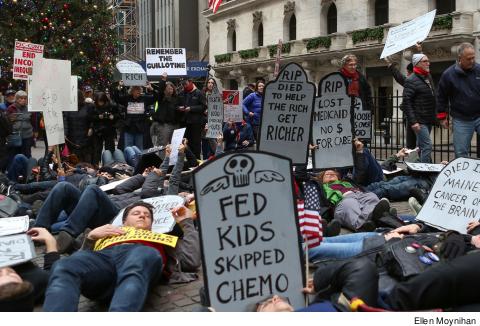 |
As ballpark philosopher Yogi Berra once quipped, “It’s déjà vu all over again.”
Or to put Berra’s oft-quoted malapropism into the context of the Republican game plan of tax cuts for the wealthy and spending cuts for everybody else, it’s the gilded age all over again.
The cry of “tax reform” is basically code for a massive redistribution of wealth flowing from bottom to top. It is not simply a case of giveaways to the privileged and corporate few, but takeaways triggered by the resulting $1.5 trillion deficit created by the tax legislation.
GRAD STUDENTS SPARED
The final bill did not include a provision that would have counted tuition waivers for graduate students as taxable income, a provision that would have effectively quadrupled their tax burden. While this was a welcome reprieve for the higher education committee, the rest of the bill is a disaster.
The contempt for working people and celebration of investment and inherited wealth was reflected by Senator Chuck Grassley of Iowa. Defending rollbacks to the estate tax, he told the Des Moines Register, “I think not having the estate tax recognizes the people that are investing as opposed to those that are just spending every darn penny they have, whether it’s on booze or women or movies.”
The House-Senate conference committee that crafted the final reconciled bill added a sweetener to change the mind of Tennessee’s Senator Bob Corker, the only Republican to vote “no” on the original Senate version. Corker announced a sudden change of heart once a tax break was inserted that lavishly rewarded real-estate investors – a bonanza for not only Corker (who has a big real-estate portfolio), but the Trump and Kushner families, 14 GOP senators and lots of big players in real-estate markets.
CLASS WAR
It’s Robin Hood in reverse. The tax bill rewards the richest Americans with a 2.6 percent reduction in their personal rate, an enticing bundle of new tax breaks and a generous revision of the estate tax that allows them to perpetuate their wealth over many generations by doubling to $22 million the amount they can now pass to their heirs tax free.
But it’s the largest reduction of corporate taxes in US history, from 35 percent to just 21 percent, that will deprive the federal government of trillions of dollars. As if that were not enough largesse, the bill abolishes the corporate alternative minimum tax, a move that will enable corporations with clever accounting to pay still less in taxes – or in some instances even zero.
The rest of us will have to reconcile the difference, not necessarily with higher taxes, but with diminished benefits and federal programs.
SMASHING THE STATE
In a December 3 analysis in its news pages, The New York Times sounded the alarm that “Republicans are preparing to use the swelling deficits made worse by the [tax] package as a rationale to pursue their long-held vision: undoing the entitlements of the New Deal and Great Society, leaving government leaner and the safety net skimpier for millions of Americans.”
It’s the old conservative refrain of “starve the beast.” Using the projected $1.5 trillion deficit triggered by the tax bill as cover, Speaker of the House Paul Ryan has already announced a wish list of cuts to safety net initiatives. Cuts to Social Security and Medicare are all but inevitable.
The starvation food chain starts with the federal government, but ultimately works its way down to state and local entities, particularly in higher-taxing blue states like New York and California. Under the GOP legislation, whether you file individually or as a married couple, deductions for state and local taxes (SALT) will cap at $10,000. This includes property taxes, the primary source of K-12 funding for many communities. Unable to soften their tax burden with unlimited deductions, taxpayers, not surprisingly, may push for lower SALT. Combined with a starvation diet of federal funds from Capitol Hill, states and local governments will face tremendous pressure to downsize their tax burdens.
Starving state and local governments by targeting SALT deductions “was our point from the start,” said Jonathan Williams, chief economist at the American Legislative Exchange Council (ALEC), a right-wing advocacy group that has successfully crafted fiscally conservative legislation for dozens of state governments.
“We hope that it [SALT caps] engenders more fiscal discipline at the state level in those high-tax states,” Williams added.
RIPPLE EFFECT
The consequences will ripple through public K-12, and higher education and multiple safety-net programs, not least being health care (compounded by the tax bill’s removal, starting in 2019, of the Affordable Care Act’s individual mandate).
The good news is that most Americans oppose these monstrous policies. That’s why we need to re-imagine the political landscape and reframe the political dialogue, as Occupy Wall Street briefly did earlier this decade, with a laser focus on inequality – and how we fight it.
Bill Friedheim is the chair of the PSC retiree’s chapter.

